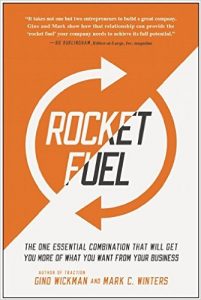 With a title like Rocket Fuel, you would think my latest read was an epic science fiction adventure. Turns out, it was a business read, but I knew that going in. The full title of Gino Wickman and Mark C. Winters book is Rocket Fuel: The One Essential Combination That Will Get You More of What You Want From Your Business. Yes, it’s a mouthful. But it also provides an accurate description of the book.
With a title like Rocket Fuel, you would think my latest read was an epic science fiction adventure. Turns out, it was a business read, but I knew that going in. The full title of Gino Wickman and Mark C. Winters book is Rocket Fuel: The One Essential Combination That Will Get You More of What You Want From Your Business. Yes, it’s a mouthful. But it also provides an accurate description of the book.
I grabbed the book through an Amazon Daily Deal back in September 2015. The book was somewhere on my reading wish list, and Amazon had a deal on business books where they were literally giving it away. I snatched the book for no charge and added it into my 2016 reading list. Unfortunately, I didn’t quite make it to Book #22 last year, so Rocket Fuel rolled over to the top of my reading list for 2017.
The book captures learnings from Wickman and Winter’s experience consulting with growth businesses. Based on their experience, they’ve created the V/I model. In this model, the ‘V’ stands for Visionary, and the ‘I’ stands for Integrator. Their contention is that all businesses have a visionary who is responsible for setting the direction of a company. On the other hand, not all businesses have an integrator, who is the person responsible for executing and organizing the company around that vision.
What they’ve found is that companies with a strong visionary-integrator partnership are able to achieve higher levels of growth and success than those without one. Their book lays out the case for the V/I partnership. It describes how to determine if you are a visionary or an integrator. Once you self-select your role, they discuss how to match yourself up with your complimenting partner.
From there, they describe the tools they use when consulting to build a strong visionary-integrator relationship. They describe the roles that each person should hold within the organization, the difficulty a visionary has letting go of the day-to-day operations, and how to execute the hand-off to the integrator. They also go into the operational details of running the business providing meeting structures and job descriptions for each that they’ve found works well in the companies they’ve helped. Perhaps most importantly, they talk about the signs of a non-functional relationship, when it’s time to call it quits, end the V/I partnership, and look for another partner.
The book is good. It’s worth the read if you’re company has achieved more than $2MM in sales but has hit a plateau. It could very well be that the size of the company has exceeded your ability to manage it and needs an integrator. Rocket Fuel will help you identify if that is the case, and it will provide the tools to move forward.
While I may not put it on my Must Read list, it’s still worth reading. My personal problem is that it’s written for a specific business niche that doesn’t apply to me, at least at this time. I could see it being very valuable in the future, when my company hits the plateau they discuss in the book.
As such, it’s targeted for those business that are in the $2MM – $50MM in annual sales that have stagnated. If that describes your business, and you need ideas to move you forward, read Rocket Fuel. It will provide plenty of valuable tools and advice. It may even help you advance your business so you can achieve that next level of growth that you’ve been looking to attain.

Pingback: My 2017 reading list - Gregg Borodaty